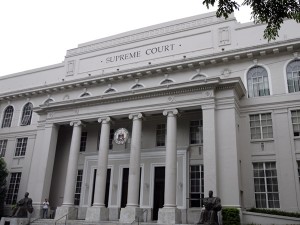Lawyer asks SC to stop PLDT’s stockholders meeting, election
MANILA, Philippines—A lawyer on Tuesday asked the Supreme Court to stop the Philippine Long Distance Telephone Company (PLDT) from holding its annual stockholders meeting and election of directors set on June 10.
In a 41-page joint consolidated reply with motion for issuance of a temporary restraining order (TRO), Dean Jose M. Roy III said before conducting the election, it should be determined first if the acquisition by the Beneficial Trust Fund Holdings, Inc. (BTF) of the preferred voting shares of PLDT is compliant with the rule on foreign ownership cap under the constitution based on the Gamboa case decision.
“Unless and until there has been a definitive showing or ruling that the acquisition by the BTF Holdings of he preferred voting shares by a Filipino national, there is no reason to allow PLDT to conduct a stockholders meeting, election of directors or perform similar powers accruing to the stockholders,” Roy said.
The high court ruling refers to the case filed by the late human rights lawyer Wilson Gamboa seeking to nullify the sale of the government-acquired 11,414 Philippine Telecommunications Investment Corporation (PTIC) in PLDT shares to Hong Kong-based First Pacific Co. Ltd worth P25.2 billion.
Gamboa argued that the sale violates the constitutional limitation on foreign ownership of a public utility and that the respondents committed grave abuse of discretion by allowing the sale of PTIC shares to First Pacific
Article continues after this advertisementIn ruling on Gamboa’s petition, the high court, in 2012 ruled that the term capital in Section 11, Article 12 of the 1987 Constitution refers only to “common” shares whose owners can vote in the election of directors.
Article continues after this advertisementThus, the high court said the Securities and Exchange Commission (SEC) should look “only to common shares, and not to the total outstanding, capital stock” in the case of PLDT.
It then directed SEC “to apply this definition of the term ‘capital’ in determining the extent of allowable foreign ownership in PLDT and if there is violation of the said provision, to impose appropriate sanctions under the law.”
Roy said pushing through with the stockholders meeting is tantamount to sanctioning “an ongoing violation of the Constitution.”
He said PLDT and the SEC both failed to address the issues he raised in his petition.
In his petition filed last year, Roy asked the high court to declare as unconstitutional the memorandum circular issued by the SEC. The circular sets forth the guidelines on compliance with foreign ownership in nationalized and partly nationalized industries.
The SEC rules that in determining the required percentage of Filipino ownership, the following conditions must be applied: a) the total number of outstanding shares of stock entitled to vote in the election of directors; and b) the total number of outstanding shares of stock, whether or not entitled to vote in the election of directors. The guidelines cover corporations engaged in identified areas of activities and enterprises be reserved to Philippine Nationals. Registered corporations were given one (1) year for the publication of the guidelines to comply with the rules.
But Roy said it is not compliant to the high court’s ruling in the Gamboa case.
“The [high court] clearly states that the 60-40 ownership requirement must apply separately to each class of shares. The language of Memorandum Circular No. 8, however, fails to make a distinction between different classes of shares and instead offers only a general distinction between voting and all other shares,” Roy said.
“The standing interpretation of the SEC found in MC8 practically encourages circumvention of the 60-40 ownership rule by impliedly allowing the creation of several classes of voting shares with different degrees of beneficial ownership over the same, but at the same time, not imposing a 40 percent limit on foreign ownership of the higher yielding stocks,” he added.
Roy also asked the high court to order the SEC to conduct a re-investigation of PLDT to determine whether it continues to violate Section 11, Article XII of the 1987 Constitution which limits foreign ownership on public utilities to 40 percent.
He said SEC should be compelled to impose corresponding penalties against PLDT once it is established that it has violated the said constitutional provision.
The petitioner said that the SEC’s findings was based on its erroneous interpretation of the high court’s ruling embodied in the Memorandum Circular.
He claimed that even before SEC was able to produce a draft of its rules, PLDT had already sought amendment of its articles of incorporation, issued ‘preferred voting shares’ and sold them to “non-complying” entities called BTF Holdings Corporation (BTF) and Mediaquest Holdings. Inc.
“Without an injunctive order from this Court, the foreign owners of PLDT will be able to elect directors who would then proceed to direct the affairs and resources of the corporation…The new board would certainly proceed towards preserving and perpetuating the foreign control of PLDT,” Roy added.
RELATED STORIES
PLDT run by Filipinos, Supreme Court told
